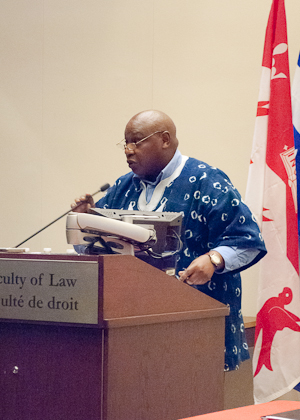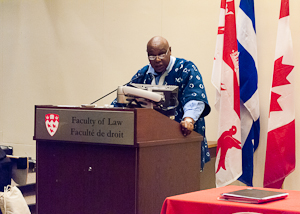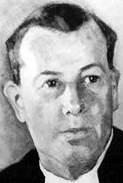Stopping by the Faculty on his way to the General Assembly in New York, The UN Special Rapporteur on the Rights to Freedom of Peaceful Assembly and Association, Maina Kiai, delivered a warm, frank, and illuminating Macnaughton Lecture on October 23.
 |
Macnaughton Lectures
The lectures were endowed by the Classes of ’75 and ’77 on the occasion of their 10th anniversaries, and launched in 1994. This year’s lecture was filmed by Concordia University’s campus/community television station, and can be viewed on CUTV. |
A lawyer trained at Nairobi and Harvard Universities, Maina Kiai has spent the last twenty years campaigning for human rights and constitutional reform in Kenya.
As the founder and Executive Director of that nation’s unofficial Human Rights Commission, as well as the Chairman of its National Human Rights Commission, he became well known for combatting political corruption and impunity for the election-related violence of 2008.
Since 2011, Mr Kiai has served as the UN Special Rapporteur on the Rights to Freedom of Peaceful Assembly and Association. He conducts fact-finding missions and examines allegations of violations of international standards. His reports serve as early warnings for any deterioration of the right to peaceful assembly and association around the world.
“It is a great honour and a rare treat for the Faculty of Law to host such a passionate global advocate for human rights and constitutional reform,” said Dean Daniel Jutras. In his opening remarks, Jutras pointed out that the global context for the rights of association and of peaceful assembly has changed significantly during the last decade, in both democratic societies and authoritarian countries—as has the phenomenon of “virtual assembly” through social media and new technologies.
“Mr. Kiai can help us take stock of these converging developments,” he said, “and give shape to freedoms in a changing world.”
Kiai’s appearance at the Faculty was co-sponsored by the Katharine A. Pearson Chair in Civil Society and Public Policy, as well as the Aisenstadt Equality and Community Initiative—in fact, it was an Aisenstadt fellow at the CHRLP, Azinatya Caron-Paquet, who coordinated the event. “The Moot court was almost full and Maina Kiai captivated the audience,” said the LLM candidate (Université de Montréal).
Speaking on “Civil Society: Dissent, Democracy and the Law,” Kiai began by explaining what he has been doing as the UN Special Rapporteur on the Rights to Freedom of Peaceful Assembly and Association. The position itself was created in 2010, after attacks against civil society had been noted in many countries across the world, and “it was felt that the UN system needed a mechanism to try to stem that—to study and to highlight it,” explained Kiai. The ‘Arab Spring’ of 2011 further highlighted the issue of freedom of peaceful protest and assembly and “made it very clear—very stark—what the challenges were at the global level.”
In his first few years on the job, Kiai reported to the UN Human Rights Council on the best practices in this field and started documenting the bad practices—impediments and barriers to free association in certain countries. He also exposed how state restrictions on the funding of civil society associations are “having a chilling effect” on human rights groups in some nations. And Kiai’s most recent report, which he presented to the General Assembly in New York on October 29, discussed threats to these rights in the context of elections. “I feel very strongly that this dimension has been underplayed internationally,” he said, noting that in recent times, the world has seen “civilian coups,” where governments have manipulated elections to stay in power, but still got international approval.
Throughout the lecture, Kiai referred to actual cases he has worked on, concrete issues he has raised with governments as far ranging as those of Georgia and Malaysia, and real people he has met from Guatemala to Vietnam. He mentioned one person, for instance, who revealed how the state was using social media as a weapon against human rights activists in his country.
“The internet is a double-edged sword,” warned Kiai.
But, he argued, all of these increasing restrictions are symptoms of a bigger problem. “Governments are getting very, very wary of civil society,” Kiai said. “They are scared—and I think they should be, to be honest. Because no matter where we look—the anti-slavery movement, the civil rights movement, getting women the right to vote, you name it—civil society groups have been the engine of change across the world.”
Part of Kiai’s mandate is to meet with such governments all around the world, in order to engage them directly on these issues. It is not always easy to be granted an interview but, he said, “there are so many countries I want to visit that if they all agreed to my requests I might do nothing else! There is so much to be done.”
Despite the enormity of his task, Kiai finds an endless source of inspiration in the many “wonderfully bright, courageous people” he meets as he travels across the world:
“Dedicated people who do democracy work, who do human rights work, who go against all odds to do what needs to be done to bring about change.”
 Is he himself an activist? “I come from a country where nowadays, if you call yourself an ‘activist,’ it is like a dirty word,” he said. Nevertheless, Kiai stated that he pursues his UN mandate “not just as an academic, intellectual pursuit, but as a human rights defender myself.”
Is he himself an activist? “I come from a country where nowadays, if you call yourself an ‘activist,’ it is like a dirty word,” he said. Nevertheless, Kiai stated that he pursues his UN mandate “not just as an academic, intellectual pursuit, but as a human rights defender myself.”
Kiai also took a moment to encourage Canadian human rights defenders to continue their work. “No matter what challenges you have in Canada, I don’t think many of you fear your government will come and arrest you, disappear you, or kill you, as they do in other countries. You have a lot of space in Canada, and you ought to enjoy it, and use it.” In his final words, Kiai exhorted us not to take our freedom for granted:
“We have all learned, and we should all know, that freedom is hard to get; and it is very easy to lose, if we are not careful.”
Voices-Voix and McGillBefore delivering the 2013 Macnaughton Lecture, Kiai also participated in an invitation-only workshop on civil society, dissent, democracy and the law, which was co-presented by the Katharine A. Pearson Chair in Civil Society and Public Policy and the Aisentadt Equality and Community Initiative, and co-organized by the Centre for Human Rights and Legal Pluralism (CHRLP), the Canadian Council for International Cooperation, and a group called the Voices-Voix Coalition. Voices-Voix is a national, non-partisan coalition which documents attacks against individuals and institutions who have “raised their voices” to critique the powers-that-be. One of our alumni, Aurore Fauret (BCL/LLB’09), is the communications coordinator there, while another, Pearl Eliadis (BCL’85, LLB’85), is a member of its Steering Committee. Me Eliadis, who is also a member of the CHRLP, gave the closing remarks after Maina Kiai’s October 23 lecture at the Faculty. “Voices-Voix has been working since 2010 to enhance our understanding of the meaning and content of fundamental freedoms like the freedom of association and free expression, and the implications of these rights for civil society in Canada,” said Eliadis. “We are delighted that the Centre for Human Rights and Legal Pluralism at McGill partnered with Voices to explore new dimensions of these fundamental rights and freedoms.” |
– Story by Bridget Wayland; Photos by Lysanne Larose.
[ JUMP TO THE CURRENT EDITION OF FOCUS ONLINE ]
//

 Devoted to contemporary issues of public policy, the bi-annual Macnaughton Lecture honours Senator Alan Aylesworth Macnaughton, PC OC QC (BA’26, BCL’29, LLD’92), who was Speaker of the House of Commons, founder and Honorary Chairman of the Canadian World Wildlife Fund, Counsel at Martineau Walker, and a member of the Faculty of Law Advisory Board.
Devoted to contemporary issues of public policy, the bi-annual Macnaughton Lecture honours Senator Alan Aylesworth Macnaughton, PC OC QC (BA’26, BCL’29, LLD’92), who was Speaker of the House of Commons, founder and Honorary Chairman of the Canadian World Wildlife Fund, Counsel at Martineau Walker, and a member of the Faculty of Law Advisory Board.